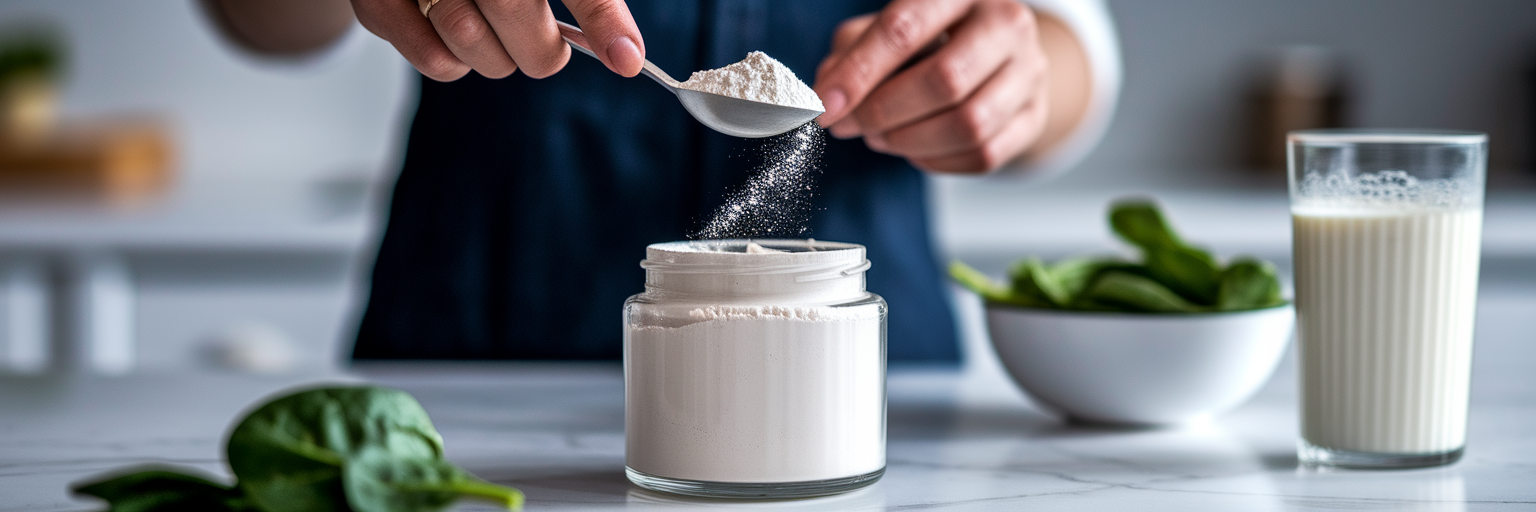The number of Americans following plant-based diets has grown substantially, and with it, the demand for effective, science-backed fitness strategies. If you're building strength on a vegan diet, you've likely wondered how to optimize your results.
The Power Duo for Plant-Based Muscle
Building muscle on a plant-based diet isn't about overcoming limitations; it's about being strategic. Think of your muscles like a construction project. After a tough workout, your muscle fibers need repairs and reinforcements to grow back stronger. This is where the combination of vegan protein and creatine comes in, working together as a powerful team.
Consider vegan protein for muscle gain as the essential building blocks. Protein provides the amino acids your body uses to repair and rebuild muscle tissue. Without enough of it, your recovery stalls, and your hard work in the gym won't translate into the strength you're aiming for.
If protein provides the materials, then creatine is the high-performance fuel for the construction crew. It helps your muscles produce energy rapidly during short, intense efforts like lifting heavy weights or sprinting. This allows you to push out that extra rep or add more weight to the bar, creating a stronger stimulus for muscle growth. One helps you recover and rebuild, while the other helps you work harder in the first place. This article is your guide to combining these two supplements effectively for maximum strength training success.
Why Creatine Is a Game-Changer for Vegans

Creatine is a naturally occurring compound that plays a critical role in your body's energy system, particularly within muscle cells. The main dietary sources are meat and fish, which presents a unique opportunity for plant-based athletes. Because a vegan diet lacks these sources, those following one often have lower baseline creatine stores in their muscles. This isn't a disadvantage; it simply means you stand to gain even more from supplementation.
In fact, research highlighted by the Cleveland Clinic suggests that vegetarians and vegans may see more significant performance improvements from using creatine. By supplementing, you're effectively bridging a dietary gap and giving your muscles a tool they were missing. This is why so many people see a noticeable difference when using creatine on a plant-based diet.
The benefits are straightforward: more power for high-intensity lifts, the ability to complete more reps and sets, and enhanced muscle growth over time. It works by increasing your intramuscular phosphocreatine stores, which is a form of readily available energy. When looking for a reliable option, a pure, third-party tested creatine monohydrate is your best bet, as it's the most researched and effective form. Always check that it's explicitly labeled as vegan.
Here’s a quick summary of the benefits:
- Bridges the dietary gap left by a plant-based diet.
- Increases power output for high-intensity lifts.
- Enhances overall work capacity during training sessions.
- Supports faster muscle growth over time.
Choosing Your Ideal Vegan Protein
While creatine fuels your performance, protein handles the recovery. After a workout, your body initiates a process called muscle protein synthesis (MPS), which is the fundamental process of rebuilding muscle. This process is triggered by essential amino acids (EAAs), with one in particular, leucine, acting as the primary "on" switch. This is why a high-quality protein source is non-negotiable for strength goals.
A common question is whether plant proteins are "incomplete." While it's true that some individual plant sources are lower in certain amino acids, this is easily managed. A varied diet or a blended protein powder creates a complete amino acid profile, giving your body everything it needs. Many high-quality blends, like those found in a good chocolate vegan protein, combine different sources to deliver a full spectrum of EAAs.
So, how much protein do you need? According to VeganHealth.org, a great target for active individuals is around 1.6 grams of protein per kilogram of body weight. To find your target, just divide your weight in pounds by 2.2 to get your weight in kilograms, then multiply that number by 1.6. This gives you a daily goal for supporting vegan protein for muscle gain.
| Protein Source | Key Benefit | Amino Acid Profile | Best For |
|---|---|---|---|
| Pea Protein | Rich in BCAAs & Iron | High in lysine, but lower in methionine. | Post-workout recovery and building lean muscle. |
| Soy Protein | Complete Protein | Contains all nine essential amino acids, similar to whey. | An all-around protein for muscle growth and general health. |
| Brown Rice Protein | Hypoallergenic | High in methionine, but lower in lysine. | Individuals with soy or dairy sensitivities. |
| Hemp Protein | Rich in Omega-3s & Fiber | A complete protein, though lower in leucine. | A whole-food approach, adding fiber and healthy fats. |
Note: This table highlights the unique strengths of each protein source. Many of the best vegan workout supplements use a blend of pea and rice protein to create a complete and balanced amino acid profile.
Perfect Timing for Peak Performance

Now that you know the what and why, let's talk about the when. Proper timing of protein and creatine intake can help you get the most out of your supplements, but the rules might be more flexible than you think. The key is consistency, not a perfectly timed stopwatch.
Protein Timing: The Recovery Window
You’ve probably heard of the "anabolic window," the idea that you must consume protein within 30 minutes of your workout. While the urgency isn't quite that dramatic, the principle holds true. Consuming 20-40 grams of protein within an hour or two after your training session is a proven strategy to kickstart muscle repair and reduce soreness. It ensures your muscles have the raw materials they need right when they're most receptive. Making it a habit is easy, especially when you can mix your protein into a delicious shake.
Creatine Timing: Consistency is Key
For creatine, the story is different. The goal with creatine is to keep your muscle stores fully saturated. This means daily consistency is far more important than the specific time of day you take it. Whether you mix it into your morning coffee, your post-workout shake, or a glass of water with lunch, the most important thing is that you take it every single day, including on rest days. While combining it with your protein shake is convenient, there's no special benefit to taking them at the exact same moment. The best routine is simply the one you can stick with without fail.
Integrating Supplements into Your Daily Routine
Knowing how to combine creatine and protein in practice is simple. It’s all about creating a daily habit that fits seamlessly into your life. Forget complicated schedules; a straightforward approach works best.
For dosage, a standard recommendation is 3-5 grams of creatine monohydrate daily and 20-40 grams of protein per serving, typically post-workout. Some people choose to start creatine with a "loading phase," taking around 20 grams per day for 5-7 days to saturate their muscles more quickly. This is completely optional. You can achieve the same full saturation by just taking the 3-5 gram maintenance dose daily, it will just take a few weeks longer. The choice is yours.
For easy consumption, try mixing unflavored creatine into your morning smoothie, juice, or even coffee—it’s virtually tasteless. For your protein, mixing it with a creamy plant-based milk like oat or soy milk can make it feel more like a treat.
Here’s what a simple daily schedule could look like:
- Morning: Take 3-5g of creatine with your breakfast smoothie or coffee to ensure you never miss a day.
- Post-Workout (Afternoon): Drink a shake with 30g of vegan protein within an hour of finishing your workout to support recovery.
- Dinner: Focus on a whole-foods meal rich in protein like lentils, tofu, or quinoa to round out your daily intake.
A Holistic Approach to Plant-Based Fitness
It’s important to remember that supplements are designed to do just that: supplement a healthy diet, not replace it. The foundation of your fitness will always be a well-rounded, whole-foods, plant-based diet, consistent training, and adequate rest. These elements work together to create lasting results.
While protein and creatine are powerful tools, vegan athletes should also be mindful of other key micronutrients like Vitamin B12, iron, and zinc to ensure their bodies are functioning optimally. This holistic view of health is what truly supports long-term strength and well-being.
Combining vegan protein and creatine is a smart, science-backed strategy that empowers plant-based athletes to achieve their strength goals without compromise. It’s about giving your body the targeted support it needs to perform at its best.
If you found this guide helpful, feel free to share it with a friend on a similar journey! And if you're ready to support your fitness goals, explore our collection of high-quality, third-party tested vegan supplements to find the best vegan workout supplements for you.



